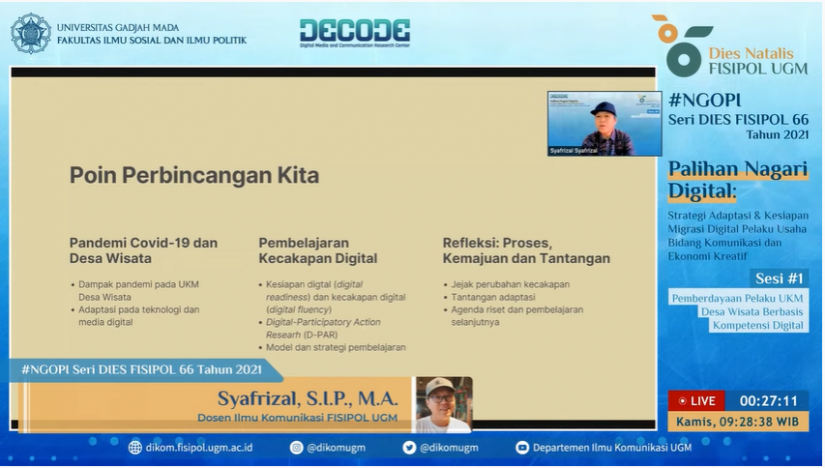
Yogyakarta, October 7th 2021─The Department of Communication Science (Dikom) together with DECODE organized the NGOPI Series of the FISIPOL UGM’s 66th Anniversary, with the theme “Digital Nagari Palihan: Adaptation Strategy and Digital Migration Readiness for Business Actors in the Communication and Economy Sector” (07/10).The first session discussed the research and learning carried out by the Dikom and DECODE teams regarding the digital skills of SME entrepreneurs in the tourism village of Pentingsari Village. This research is motivated by the COVID-19 pandemic situation which has an impact on tourist villages. Ginarti, an SME entrepreneur from Ginarti Garden from Pentingsari Village, admitted that the COVID-19 pandemic caused the number of tourists to decrease. This condition requires citizens to do business through digital platforms, including SME entrepreneurs who are not yet digitally savvy.
According to Syafrizal, one of the Dikom lecturers involved, digitalization in Indonesia still faces several challenges, such as the lack of community digital readiness data. Through this research and learning, the DECODE team was able to explore data while providing training on taking photos and videos, editing, and marketing products through digital platforms.
Optimization of tourist villages is also related to tourism accompanied by support for sustainability and protection of socio-cultural values, traditions, nature, and resources. Lisa Lindawati, as a Dikom lecturer who was also present as a speaker, said that social media makes tourist attractions in Indonesia easy to go viral, but the readiness of the community and management of the surrounding areas is not guaranteed. According to her, community-based tourism objects must pay attention to local wisdom and the surrounding environment.
The activity continued with the second session discussing the strategies of journalists and online media to deal with social restrictions. Wisnu Prasetya, Dikom lecturer and speaker, mapped out three changes in the world of journalism during the pandemic. First, the increasing trend of media business models through donations, memberships, or subscriptions. This was driven by changes in consumption, which indicated an increase in the number of readers and subscribers at the start of the pandemic.
Agib Tanjung, deputy managing editor of Brilio.net who was also present as a speaker, added that the consumption of SEO news increased during the pandemic. According to him, timeless news about daily needs has become a favorite for Brilio.net and Merdeka.com readers.
The third change in the world of journalism, namely adaptive demands with technology. According to Mahadevi, the speaker who is a sports journalist for RRI, the situation of social restrictions has also led to ethical changes in the practice of interviewing source persons. Journalists must be careful when interviewing sources online because they are prone to information reduction. Interestingly, the data shows that the number of journalists has decreased in several countries, including Indonesia. “However, we need to remain optimistic. The role of journalists is very much needed in the current flood of information situations. Don’t be afraid to die, but have to be able to adapt,” Mahadevi said.
